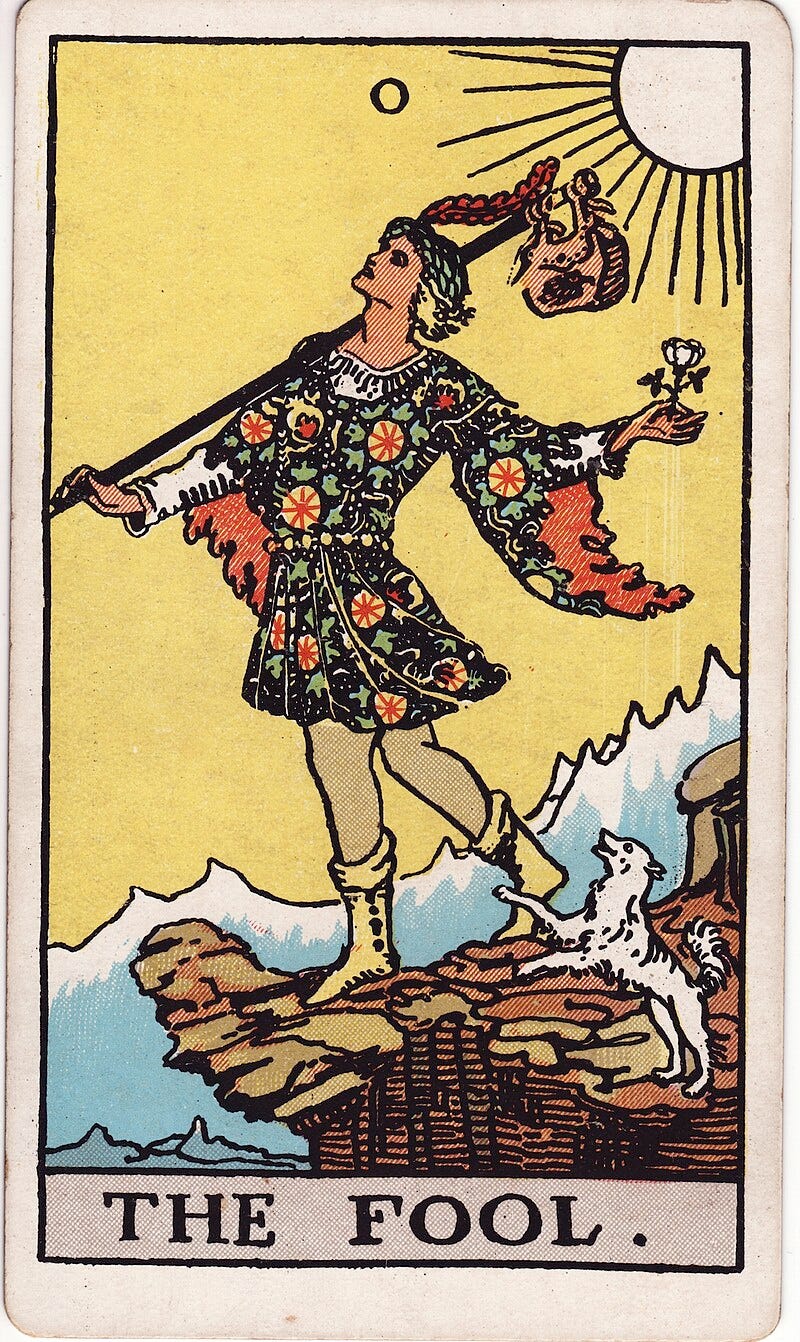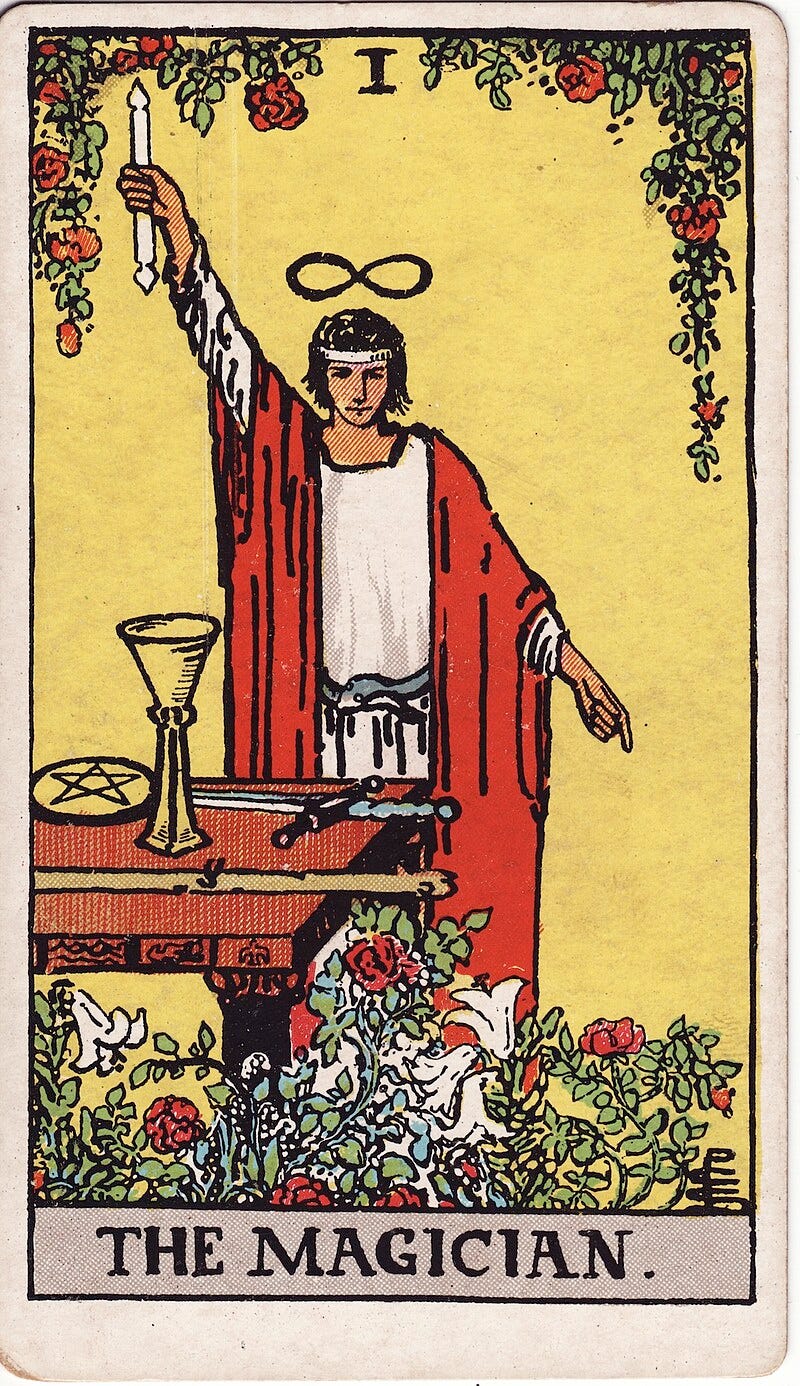You have to be completely foolish to live this way
Applying tarot symbolism to the creative journey
To be nobody but yourself in a world which is doing its best, night and day, to make you everybody else means to fight the hardest battle which any human being can fight; and never stop fighting.
E.E. Cummings
Finding magic in a world being killed by big business
We tell ourselves we live in a secular world, that religion has faded. Maybe we lament the lack of spirit, how everything feels superficial and consumerist. But suppose for a moment that everything has actually become more religious. . . .
Shopping becomes tithing—we give alms to the devotees staffing the temples of Home Depot and Whole Foods. The branded shirt across your chest? You're wearing the mark of your chosen deity, Patagonia. Going to work, we're monks diligently toiling for the glory of our god. The CEO serves as high priest, the one whose role is to commune with the vision, to consult with "the board"—those shadowy bishops representing the shareholders' interests like a kind of corporate holy spirit.
This isn't much of a metaphorical stretch. Consider how we speak of companies and brands as if they possess actual consciousness. We're encouraged to talk about "the brands you love," as if corporations and franchises deserved our affection.
Branding works as a metaphor for conditioning itself—the marks burned into our consciousness that tell us who we're supposed to be, what we're allowed to want, which tribe we belong to. I find this fascinating. Corporate entities are legally considered people. This Citizens United reality runs deep. If you've seen the documentary The Corporation, it diagnoses corporations as if they really were people and concludes that the kind of people they are is psychopaths.
How to be free of this business-based religion? Learn from the fool archetype.
Here, I’m talking about tarot. A tarot deck contains 78 cards used for divination and self-reflection. It's divided into the Minor Arcana (56 cards in four suits) and the Major Arcana—22 archetypal cards representing life's spiritual journey.
The Fool, numbered 0, is the first Major Arcana card and represents the beginning of this quest. As an archetype, the Fool embodies pure potential, innocence, and the courage to step into the unknown. The fool carries minimal baggage, trusts the universe, and approaches life with openness.
The Fool asks: Are you willing to begin? To look foolish? To trust the call of something you can't yet name?
The fool card in Rider-Waite tarot
I love the depiction of the fool in the Rider-Waite Tarot deck. He stands at the edge of a cliff and gives every impression of intending to keep going in that direction. Dressed in colorful, ornate clothing, the fool carries a white rose in one hand and a hobo bindle on a stick over his shoulder. A weird little white dog leaps at his heels looking equally foolish. The sun shines brilliantly at his back and snow-capped mountains rise in the distance.
The fool vs. the hero
The fool has a lot of potential. Unlike the hero's journey that Joseph Campbell mapped (which follows a predictable arc of call, refusal, mentor, threshold, trials, return), the fool's journey through the Major Arcana is rich and layered and more interior.
The hero’s journey monomyth is fundamentally masculine-coded—penetrate the unknown, slay the dragon, return victorious. The Tarot includes yin principles: The High Priestess's intuitive knowing, The Empress's creative abundance, The Star's quiet hope.
Most importantly, the Hero's Journey suggests you become someone different. The Tarot suggests you become who you always were—The World (the final card) is the Fool dancing, not the Fool transformed into something else. It's about revelation, not conquest.
The fool embodies the number 0—our empty-headed friend wears a zero right there above his head. Good for him. The fool is not even truly "first" but more like the void from which all character emerges. The fool is wise in his naivety, able to fly and about to fall.
I find the fool’s journey richer than the hero archetype because the fool epitomizes a kind of purity. Unlike many would-be heroes, the fool doesn't seek glory or completion. He seeks experience, the encounter of consciousness with existence. The fool is a good metaphor for what it means to be a good and true artist. Don’t you think?
Journey from fool to magician
The card after the fool is the magician. The magician is what the fool can become when he continues his quest. The transformation from fool to magician represents a great alchemical shift in consciousness. Whereas the fool has undifferentiated potential, the Magician has will and focus. The magician has gotten in touch with all the forces inside—the good, the bad, and the ugly. The magician has seen some stuff and made difficult choices and chosen truth. The fool's hidden belongings kept within their bundle become the magician's visible tools, the symbols of mastery.
I like the fool’s journey as a model for life because it doesn’t pain the picture of growing up or becoming serious or that the right eventual goal is warrior or king. I think it’s necessary for the magician to be in touch with the forces of warrior and king, but all the other ones as well.
The Magician stands with one arm raised to heaven, holding a double-ended wand, while the other points to earth—as above, so below. On the table lie the four suits of the Minor Arcana: cup, pentacle, sword, and wand, which represents mastery over emotion, material reality, thought, and will.
Above their head floats the lemniscate (infinity symbol), and they wear red robes over a white garment. The Magician has learned that consciousness can direct energy, that intention can shape what happens. They are the fool who has discovered their own creative power without losing the essential spontaneity that began the journey.
The Magician says: "I now know that I can work with the forces of existence, not merely wander through them."
Becoming the magician, the innocent power the fool always carried can be channeled with total freedom. Now there’s not just the white rose of innocence but red and white flowers above and below, which suggests the churning of purity with passion, heaven with earth.
The fool is free
I began by saying you have to be foolish to live this way—to place creative endeavor at the center of your life. That’s how I want to be. Whether you pursue it as a profession, answer it as a calling, or guard it as an essential hobby that feeds something irreplaceable within you, the choice requires a certain foolishness.
I think is true. You do have to be foolish.
But not because fools are stupid. Fools are, let’s say, unmarked—they aren’t burdened by the world's heaviness, haven't absorbed its damp weight and farty aroma into their bones. They haven't internalized all the fear-based limitations a world-wise person is supposed to have.
So, they’re not stupid, but maybe the fool is absent-minded in a good way, in the sense that they aren’t clouded by the accumulated cultural sediment, the internalized dogmas that serve mainly to make us predictable consumers, reliable cogs in someone else's profit machine.
The fool's mind remains mercifully empty of the reasonable voice that says creativity doesn't pay bills, that art is for better people, that your particular gift isn't good enough to matter. They haven't yet learned to partition existence into practical and impractical, haven't accepted that some essential part of themselves should be permanently deferred.
If it’s absent-mindedness, it’s really a form of presence. While others carry the weight of what they've been told is impossible, the fool remains light enough to step into the space where creation happens.
Unfoolish creative people get claimed by the currents of business and commerce, used, absorbed by these collective entities. Their creativity becomes fuel for something that serves aims entirely different from the artist's impulse. The brand. The shareholder’s interest.
The brand says: "Your creativity belongs to us now. We'll tell you what it means."
The fool remains unmarked, unclaimed. They haven't yet agreed to let their creative force serve someone else's vision, haven't learned to filter every impulse through the question "but is it marketable?" They understand that pure creativity is useless in the best sense.
This is why the fool can still create from that pure place—they still belong to themselves.
Being foolish circumvents co-opted creativity
Anything innovative that corporations claim as their own—think of "brand" as cattle brand, a mark of ownership—really comes from the people creating it.
These consciousnesses create the currents we swim in—unless we're foolish enough to chart our own course.
I don't think we can get entirely beyond them. Believe me, I've tried. I lived off-grid for years. My heart still lives off-grid. But getting beyond them isn't about escape—it's about swimming while staying connected to our thread of truth, that evolving, sometimes invisible sense of self. Our heart's yearning. The call of love.
And that brings us back to earth: You can only work with what you've got, from where you are.
So the fool’s journey is alchemical. We find ourselves in circumstances that surprise and confound us—various genetic and karmic lotteries dealt without our choosing. The point isn't to win at the corporate game but to navigate its currents when necessary and use them to reach where our hearts know we need to go.
Not because what's right is predetermined—I don't believe in predetermination. Fate's book gets written with our participation. Like the Sorting Hat in Harry Potter, there's a conversation happening. Your preference matters.
Right now this is all very easy for me to say. I'm sitting in an air-conditioned room on Ko Tao, the sea lapping a few feet from my doorstep.
Actually, this universal desire to be near the ocean is a fitting metaphor, too. We all want to be near the ocean though most of us have no practical relationship with it. The ocean brings no material wealth—few aspire to be fishermen, to subsist on what they can pull from the depths, to accept that particular bargain of effort and uncertainty. Yet coastlines are our most densely populated areas despite being economically "useless" terrain. We feel wealthy in its presence. It brings pleasure and joy, like a creative pursuit does.
The fool’s uselessness is priceless
The artist's life holds the same impractical magnetism. Most people don't actually yearn to be artists—which is good for artists, because it allows the whole economy of art to function. You can afford to buy my books because you earn a living doing something economically valuable. Then again, if everyone were an artist, we wouldn't need an economy. Maybe that’ll happen someday. Someday John Lennon will descend with Jesus and the horses of the apocalypse and we'll have one big drum circle, each playing our own tune, all of us harmonious.
So I support the creator economy—paying a few dollars monthly for someone's Substack or Patreon or Github repo, sponsoring and buying things from fools. It's beautiful.
You have to be foolish to live this way because only the fool remains unburdened by the world's weight, able to drop all expectations, risk everything from inspiration rather than strain. The fool doesn't worry about the economy. The fool lets the magician, who is already in touch with total abundance, handle practicalities. The main thing is that the fool commits to the quest.
I think the real quest is to become conscious of life's default backdrop, all those limiting beliefs that prevent us from receiving good ideas. It's about shifting from that unconscious frequency to one where you sense something good approaching, where you trust the intelligence of your own unfolding.




🤍